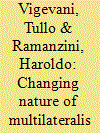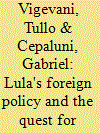| Srl | Item |
| 1 |
ID:
111757


|
|
|
| 2 |
ID:
101364


|
|
|
|
|
| Publication |
2010.
|
| Summary/Abstract |
important characteristic of the current international setting is the crisis of the structure in existence, rather than the emergence of a new order. The rise of new interests and demands, as well as the speed of the transformation make the current understanding of global governance more complex. Brazil, like other medium powers, has an interest in institutionalised multilateralism as a means of increasing its bargaining capacity and hindering the unilateralism of major powers, without being antagonistic to them. It is attempting to increase its weight in traditional international bodies, which provide the grounding for international legitimacy, as well as in new informal arrangements. While this strategy could lead to the establishment of a new hierarchy that brings in countries of growing relative importance, it has put the weight of regional integration into another perspective in Brazilian foreign policy.
|
|
|
|
|
|
|
|
|
|
|
|
|
|
|
|
| 3 |
ID:
079687


|
|
|
|
|
| Publication |
2007.
|
| Summary/Abstract |
The objective of this article is to analyse the changes brought about by the foreign policy of Lula's first administration (2003 - 06). To discuss the topic, we will make use of three notions: autonomy through distance, autonomy through participation and autonomy through diversification. These notions explain the main changes occurring in Brazilian foreign policy from 1980 to the mid-2000s. We will conclude by demonstrating how the autonomy through diversification notion best applies to the 2003 - 06 period
|
|
|
|
|
|
|
|
|
|
|
|
|
|
|
|